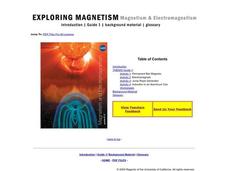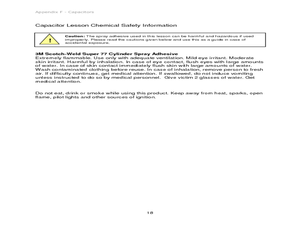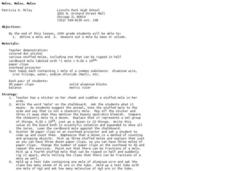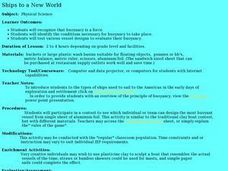Curated OER
The Water Cycle
Observe the stages of the water cycle by completing 3 activities. To help understanding of the water cycle your students can observe evaporation, the formation of frost, vapor and water and the process of distillation which is used to...
Curated OER
Solar Kit Lesson #15 - Solar-Powered Electrolysis of Water and the Hydrogen Economy
An outstanding lesson plan awaits your physics fledglings! After reading about how hydrogen can act as an energy carrier, they examine the electrolysis of water using solar power. They test the gases produced for flammability and will...
Texas State Energy Conservation Office
Nuts! Calculating Thermal Efficiency
Oh nuts! Do macadamias or almonds produce more thermal energy? Energy enthusiasts find out with this experiment. The objective is to demonstrate to your class how the chemical energy contained in foods can be converted into useable...
Alabama Learning Exchange
Good Litter, Bad Litter
Which ones can be thrown on the ground? Discover the difference between natural litter and unhealthy trash, helping scholars by using several examples. Use the information here to give them a basic background, but also encourage prior...
Curated OER
Junkyard Wars: Air Movers
Students study Rube Goldberg machines. In this investigative lesson students design and build a machine that uses several steps to move an aluminum can.
Curated OER
Exploring Magnetism
Ninth graders explore magnetism and complete several worksheets. In this magnetism lesson students complete several activities on magnetism and aluminum cans.
Baylor College
What Is the Water Cycle?
Small groups place sand and ice in a covered box, place the box in the sunlight, then observe as evaporation, condensation, and precipitation occur. These models serve as miniature water cycles and demonstrations of the three phases of...
Curated OER
Erosion
Fifth graders engage in some activities that will help them to identify erosion and explain the causes of erosion. They also look into ways that humans can slow the process of erosion in some cases. After a teacher-led demonstration,...
Curated OER
Determining the Molar Mass of a Gas
Students determine the molar mass of a gas. For this molar mass of a gas lesson plan, students use the vapor density of an organic solvent to determine its molar mass. They vaporize the solvent and collect the vapor. Once it is cooled...
Curated OER
Capacitors: What Are They?
Young scholars discover how capacitors help store data. In this computer science lesson, students investigate how capacitors can store an electronic charge, eventually helping computers store data. Young scholars create their own...
Curated OER
Get Down With Density
Students define density and observe that things that are less dense than water will float. Students find the density of copper, iron and aluminum
Curated OER
Can Magnets Interact With Objects Through Different Materials
Second graders experiment with and explore magnets. They manipulate them to see how they react with other magnets and with other objects. They experiment to see how magnets work through different thicknesses of objects (paper,...
Curated OER
Can You See the Light?
Students investigate the transmission of light energy. In this light energy lesson plan, students observe bubbles using different colored filters and record their observations. They also look at a light source through various materials...
Curated OER
Can or Bottle Crusher (Demonstration)
Learners witness the gas law from a demonstration in which a can collapses after the steam escapes. The steam pushes out most of the air from inside the can and then the air outside presses against the can crushing it.
Smithsonian Institution
Watching Crystals Grow
Amazing science can sometimes happen right before your eyes! The class gets cozy as they watch crystals grow. They use Epsom salts, rocks, and food coloring to create crystals. They'll observe the entire process, documenting every step...
Curated OER
Honey, I Shrunk the Lids!
Students discover the lightweighting concept used by manufacturers. For this environmental education lesson, students research the reduction of the amount of aluminum used in cans. Students wrap the lesson up by writing a newspaper...
Curated OER
What is an Atom?
Third graders understand that the smallest particle is an atom. In this matter lesson, 3rd graders make a piece of aluminum smaller and smaller to see that what's left is still aluminum. Students recognize that cutting into smaller...
Curated OER
Moles, Moles, Moles
Students investigate moles and measure out a mole by mass and volume. In this mole lesson plan, students observe demonstrations of quantities of substances that measure 1 mole. Students use a solid aluminum block and ruler to measure the...
Curated OER
Ships to a New World
Students experiment with buoyancy as a force. In this buoyancy lesson, students access an assigned website to examine the sailing vessels that came to the New World. They work as teams to build boats out of aluminum foil to see which...
Curated OER
Identifying Watersheds with Topographic Maps
Students model a watershed and delineate one using topographic maps. In this hydrology lesson, students use aluminum foil to model a landscape and observe how water moves on it. They also observe the features of a topographic map and use...
Curated OER
I've Got That Sinking Feeling
Students design a simple boat and predict how much weight it can carry. They should also discover why objects float or sink and how this can be determined experimentally. A great lesson on buoyancy!
Curated OER
The Magic School Bus Out of This World
Students learn along with Ms. Frizzle's class. In this Magic School Bus lesson plan, students explore craters that objects of different sizes and weights (marbles, Ping-Pong balls, and aluminum foil balls) create.
Curated OER
Learning About Matter And Energy
Learners learn about matter and energy. In this science lesson plan, students gain an understanding of the properties of matter and energy as they discover that some things float, some things dissolve in water and discuss that energy can...
Curated OER
Buoyant Boats
Learners design and construct a boat out of aluminum foil and a few other simple materials. The boats then be tested by floating them in water, then adding mass until they sink. They explore the various shapes of boat construction.

























